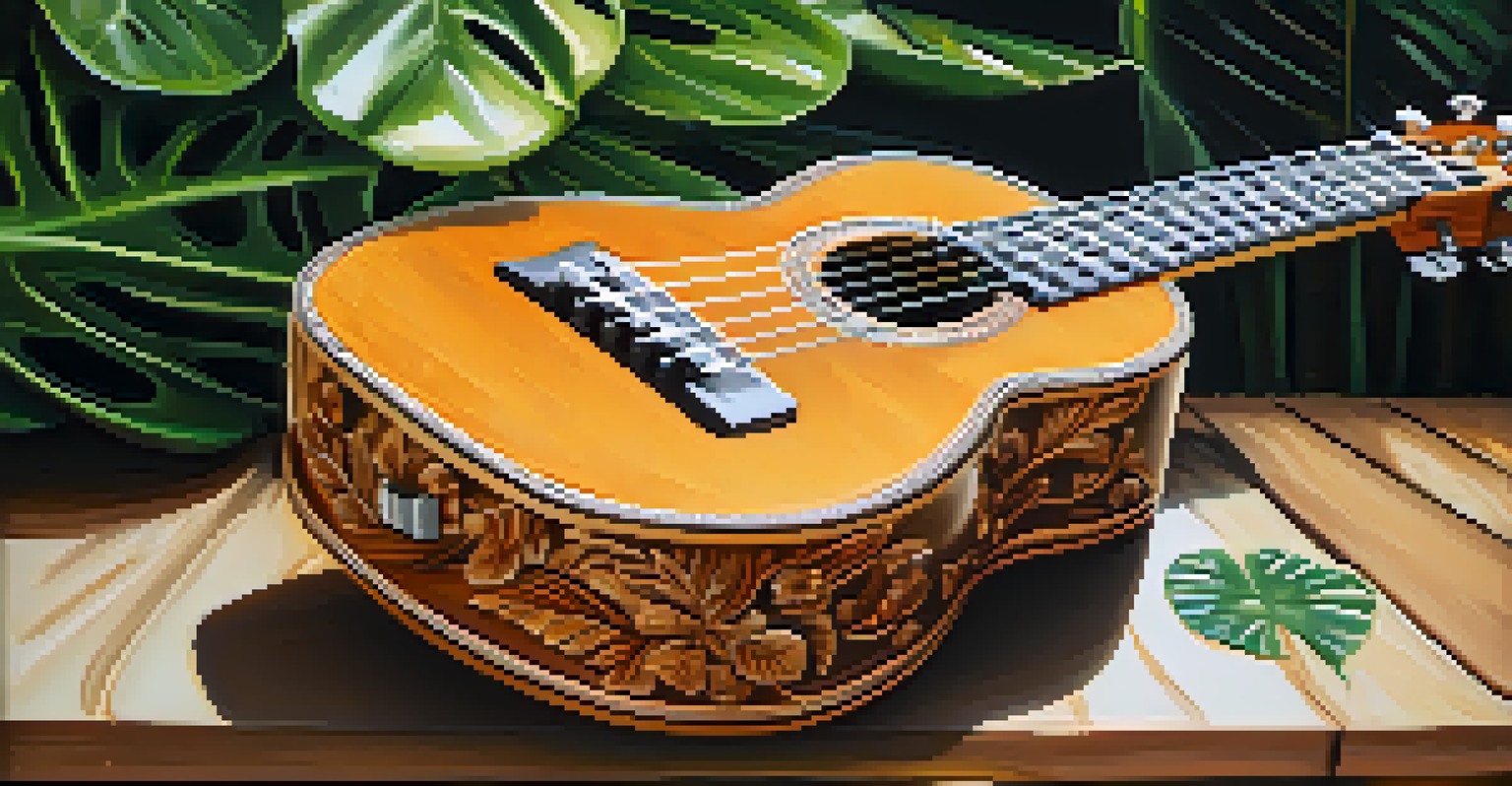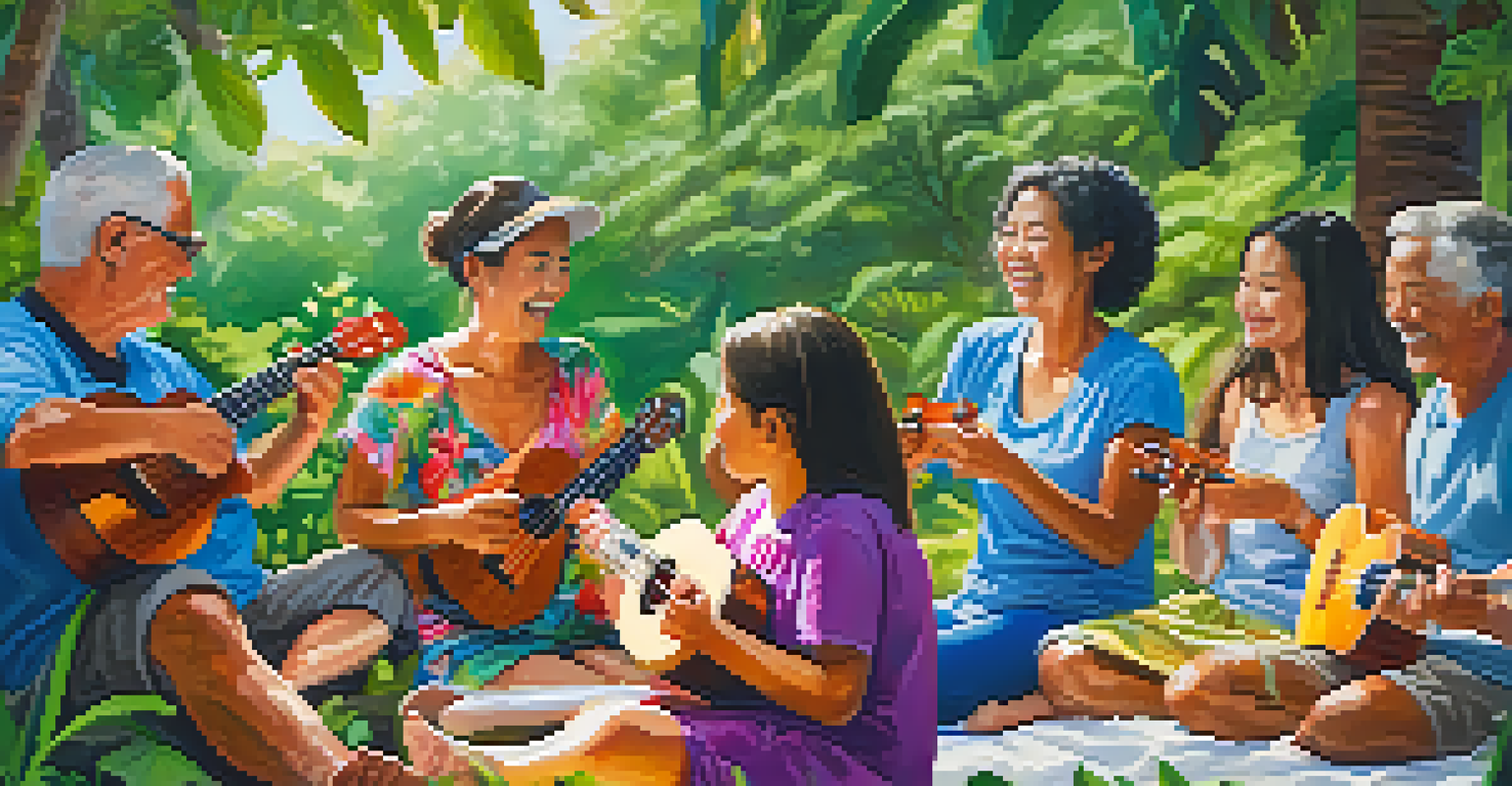The Ukulele: A Symbol of Hawaiian Identity and Heritage

The Origins of the Ukulele in Hawaiian Culture
The ukulele, often associated with Hawaii, has roots that trace back to the 19th century. It was brought to the islands by Portuguese immigrants, who introduced their small guitar-like instrument called the braguinha. Over time, this instrument was adapted and embraced by the local Hawaiian population, blending with native musical traditions.
The ukulele is a wonderful instrument with a great history, and it’s rooted in the culture of Hawaii, which is rich with stories and traditions.
The name 'ukulele' itself means 'jumping flea' in Hawaiian, a playful nod to the lively finger movements used while playing. This cheerful sound soon became synonymous with Hawaiian music, illustrating how the instrument evolved into a beloved symbol of island culture. It's fascinating how a simple instrument can encapsulate a fusion of influences and stories.
Today, the ukulele serves not only as a musical instrument but as a representation of Hawaiian identity. It showcases the spirit of Aloha, connecting people through music and shared cultural experiences. When you hear its sweet, melodic tones, it’s like a warm invitation to join in the celebration of Hawaiian heritage.
The Ukulele's Role in Hawaiian Music and Dance
In Hawaiian music, the ukulele plays a central role, complementing traditional hula dance. Its bright, cheerful sound perfectly captures the essence of island life, making it a staple in both casual gatherings and formal performances. The ukulele's ability to convey emotion through its melodies is truly captivating, bringing stories and feelings to life.

The instrument is often used in popular Hawaiian music styles, including traditional slack-key guitar and contemporary pop. Musicians like Israel Kamakawiwoʻole have showcased the ukulele's versatility, blending traditional songs with modern influences, which has further solidified its place in both local and global music scenes. This blend of old and new makes the ukulele a bridge between generations.
Ukulele's Cultural Significance
The ukulele serves as a powerful symbol of Hawaiian identity, reflecting the island's rich heritage and the spirit of Aloha.
Moreover, the ukulele encourages community engagement through music. Schools and cultural organizations often incorporate it into their programs, fostering a love for Hawaiian music among youth. This connection strengthens cultural ties and ensures that the rich traditions surrounding the ukulele continue to thrive.
The Ukulele as a Cultural Symbol and Identity
The ukulele has transcended its role as a mere musical instrument to become a powerful symbol of Hawaiian identity. It reflects the resilience and creativity of the Hawaiian people, showcasing their ability to adapt and innovate. When played, it evokes a sense of pride and belonging among those who call the islands home.
When you play the ukulele, you’re not just playing music; you’re sharing a piece of the Hawaiian spirit with the world.
Tourists often purchase ukuleles as souvenirs, further spreading its cultural significance beyond Hawaii. Each strum carries a piece of the islands, inviting the world to appreciate and celebrate Hawaiian heritage. This global reach has helped the ukulele become synonymous with the spirit of Aloha, promoting understanding and appreciation of Hawaiian culture.
In essence, the ukulele embodies the heart and soul of Hawaii. Its cheerful notes and rich history allow it to resonate deeply with both locals and visitors, making it a cherished emblem of the islands. As long as the ukulele continues to be played, so too will the stories and traditions of Hawaii.
Prominent Ukulele Players and Their Impact
Several renowned ukulele players have significantly impacted the music landscape, both in Hawaii and globally. Artists like Jake Shimabukuro have taken the instrument to new heights, showcasing its versatility and technical prowess. His innovative playing style and engaging performances have drawn attention to the ukulele, inspiring countless musicians around the world.
Also, musicians like Tina Guo and James Hill have contributed to the evolution of ukulele music, blending various genres and styles. Their work not only highlights the ukulele's adaptability but also encourages younger generations to explore its potential. This cross-pollination of musical influences has led to a vibrant ukulele community worldwide.
Role in Music and Community
In Hawaiian music, the ukulele plays a central role, fostering community engagement and bridging generations through shared musical experiences.
These artists serve as ambassadors for the ukulele, promoting Hawaiian culture through their music. By sharing their passion and talents, they encourage others to pick up the instrument and share in the joy it brings. Their impact extends far beyond music; they are helping to preserve and celebrate the rich cultural heritage of Hawaii.
The Ukulele in Modern Hawaiian Festivals and Events
Ukuleles play a vital role in Hawaiian festivals and cultural events, bringing people together to celebrate their heritage. Events like the Waikīkī Ukulele Festival showcase the instrument's popularity and its ability to unite both locals and visitors in a shared love for music. These gatherings often feature performances by both established and budding musicians, creating an atmosphere of joy and community.
During these festivals, attendees can participate in workshops, learning to play the ukulele themselves. This hands-on approach not only fosters a sense of connection but also ensures that the art of ukulele playing is passed down through generations. It's a beautiful way to keep the spirit of Hawaiian culture alive.
Moreover, the presence of the ukulele at these events highlights its role as a cultural ambassador. As people from all walks of life come together to enjoy the music, it reinforces the message of Aloha and the importance of cultural exchange. The ukulele, in this context, becomes a bridge that connects diverse communities.
Learning to Play the Ukulele: A Unifying Experience
Learning to play the ukulele is often described as a joyful and accessible experience. With its simple chord structures and light weight, beginners can quickly pick it up and start strumming along to their favorite songs. This ease of learning makes the ukulele a popular choice for music enthusiasts of all ages.
Many communities offer ukulele classes and gatherings where players can share tips and techniques. These sessions not only provide valuable instruction but also foster friendships among participants. The camaraderie built through shared learning experiences creates a strong sense of belonging, reflecting the very essence of Hawaiian culture.
Future and Global Influence
The ukulele continues to evolve and thrive globally, encouraging cultural exchange and ensuring the preservation of Hawaiian traditions.
In essence, picking up the ukulele can be a transformative journey. It opens doors to creativity, self-expression, and connection with others. Whether you're playing on a beach or in a living room, the ukulele has a unique ability to bring people together, making it a cherished part of Hawaiian identity.
The Future of the Ukulele and Hawaiian Culture
As we look to the future, the ukulele remains a vital part of Hawaiian culture, evolving with the times while staying true to its roots. New generations of musicians are infusing the instrument with fresh sounds and styles, ensuring that it continues to thrive in contemporary music. This evolution is a testament to the ukulele's versatility and enduring appeal.
Moreover, the global popularity of the ukulele encourages cultural exchange, allowing people from different backgrounds to engage with Hawaiian music and traditions. This interaction fosters a greater appreciation for Hawaiian culture, creating opportunities for collaboration and innovation. The ukulele, in this sense, serves as a cultural ambassador that transcends geographical boundaries.

Ultimately, the future of the ukulele is bright. As long as there are people who love to play and share its joyful sound, the spirit of Hawaiian culture will live on. The ukulele will continue to be a symbol of identity, heritage, and the universal language of music that brings us all together.